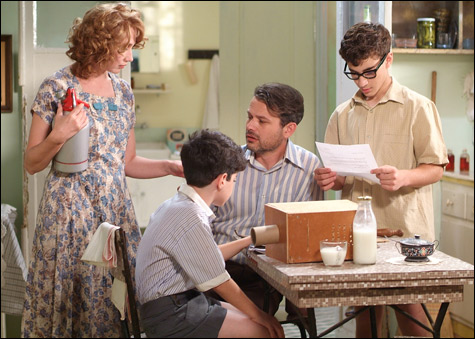
DEAR MR. WALDMAN: Your son is alive and well and advising JFK. |
Nations lie about the past. So do families, and maybe the habits — denying the truth, keeping secrets, romanticizing events, and forgetting unpleasantness — that have become routine for modern governments originated in the social unit of parents and siblings. It’s a theme that recurs in several films in this year’s Jewishfilm.2007, the annual festival established by the National Center for Jewish Film (complete schedule here), a group attuned to the politics and psychology of remembering and forgetting.
Needless to say, the Holocaust looms over all modern memory, and it figures with poignance and terror in Israeli director Hanan Peled’s autobiographical first feature, Dear Mr. Waldman (2006; Wasserman Cinematheque, April 15 at 7 pm, with the director present). The film starts out in Cinema Paradiso fashion with a voiceover from a pre-adolescent kid, Hilik (Ido Port), whose passion for movies (Spartacus is his favorite) elevates him above his humdrum surroundings — Tel Aviv in 1962. Hilik’s naive and fanciful point of view takes in the domestic travails of his mother and father, Rivka and Moishe, both Auschwitz survivors, the latter still mourning his loss there of his first wife and son. When Moishe sees a picture in the paper of Jack Waldman, an adviser to President Kennedy, he’s convinced the man is the son he thought he’d lost. In an attempt to make his father happy, Hilik fakes a letter from Waldman, another familiar plot device in this kind of movie. But the hilarious and heart-rending chaos that erupts transcends cliché. A scene in which two Holocaust survivors clutch together in an illicit embrace passes from broad comedy to wrenching pathos to stark horror, and the performances, especially from the changeling-like Port, haunt the memory.
Unlike the Waldmans, the Hakim triplets in Dina Zvi-Riklis’s Three Mothers (2006; Wasserman Cinematheque, April 21 at 8:30 pm) escaped the worst of the 20th century, and their melodrama is largely of their own making. Born in 1942 in Alexandria to a spice merchant and King Farouk’s midwife, they cherish a photo of themselves as infants receiving the king’s blessing. But six decades later, they’ve long been repatriated in Israel, and the blessing has worn thin, as sister Yasmin’s need for a kidney transplant stirs up long repressed family secrets revolving around sister Flora’s missing son, all dutifully recorded by sister Rose’s daughter Rucha on video. The revelations are trashy but engaging; Zvi-Riklis’s clumsy flashback style is clunky but adequate.
Moishe in Alejandro Springall’s Morirse está en hebreo|My Mexican Shiva (2006; Wasserman Cinematheque, April 14 at 8:30 pm, with Ilan Stavans, author of the story the film is based on, present) goes the kidney-transplant crisis in Three Mothers one further: he drops dead of a coronary while dancing to the music of his favorite mariachi band. Moishe has led a meshugge life, as one of the two white-bearded rabbinical angels filling in his life’s ledger of light and darkness comments, so the seven days of his shiva guarantee some wacky, sordid, and sometimes moving disclosures and encounters.